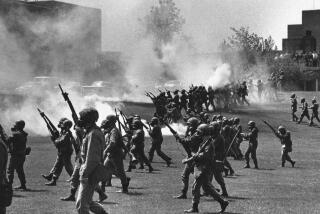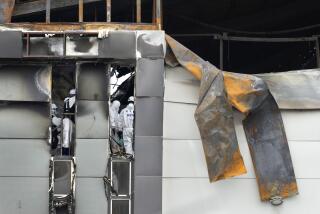Pentagon Will Investigate Vets’ Massacre Story
WASHINGTON — The Pentagon, in an abrupt about-face, declared Thursday that it would use “whatever resources are available” to investigate whether U.S. infantrymen massacred more than 100 South Koreans in 1950 during the chaotic opening weeks of the Korean War.
Although a recent Army study found no basis for survivors’ claims, Army Secretary Louis Caldera said new disclosures justify a “quick and thorough” study of the actions of 1st Cavalry Division troops at the rural hamlet of No Gun Ri, 100 miles southeast of Seoul.
While stressing that the investigation is at its earliest stage, Caldera hinted that if evidence of killings is found, some redress might be paid to the 30 South Koreans who have unsuccessfully pressed claims to the American and South Korean governments.
An Associated Press investigative report, carried on the front pages of major U.S. newspapers on Thursday, contained accounts of former soldiers who said they took part in the massacre.
The soldiers said U.S. forces trapped hundreds of old men, women and children under a railroad bridge at No Gun Ri during a panicked southward retreat in July 1950. Fearing the presence of North Korean troops concealed in civilian garb, the soldiers slaughtered anywhere from 100 to 300 or more South Koreans over a three-day period, the AP report said.
Although some accounts were contradictory, six veterans said they fired on the refugees, and six others said they had witnessed the shootings.
If corroborated, the alleged massacre would rank as one of the largest such incidents perpetrated by U.S. soldiers in modern times, and could prompt a broader reexamination of the actions of American servicemen in the Korean War.
A senior defense official acknowledged that the report raises questions about criminal liability of the soldiers involved, possible compensation and the need for an official U.S. apology. Such issues are “all on the table,” this official said.
Although plans are preliminary, the probe is expected to take roughly a year and to cost an estimated $1 million to $2 million. It may call on the expertise of military historians, forensic pathologists and military lawyers, the official said.
Officials said they expect the investigation to involve painstaking reviews of records and logs to determine where infantry units were at certain dates, examination of the testimony of surviving veterans and perhaps excavation of the site for evidence.
On Wednesday, a Pentagon spokesman had said that the allegations had been sufficiently checked and that no need was seen for further examination. But after a thunderclap of publicity Thursday, senior leaders said it had become imperative to gather more data on an incident involving one of America’s closest allies.
At the White House, President Clinton said he had been briefed on the Associated Press report.
Defense Secretary William S. Cohen “wants to look into this, he wants to get to the bottom of it, he wants to examine all of the available information and evidence,” Clinton said. “And he has assured us that he will do that.”
In Seoul, the South Korean government promised its own investigation. Foreign Ministry spokesman Chang Chul Kyun said officials would “try to verify the truth of all related things concerning this case.”
The Army’s Center for Military History conducted one study of the No Gun Ri allegations early this year and found no substantiation for the charges. Although the center checked war logs and documents, it did not interview surviving veterans.
In a letter summarizing its findings, the center noted that the early days of the Korean War were characterized by “great stress and chaos” in which U.S. troops were undertaking their longest retreat in history “and facing heavy odds.” It cited the “communist practice of . . . infiltrating disguised as civilians.”
The 30 Koreans filed claims with the South Korean Government Compensation Committee in 1997 but were told that a five-year statute of limitations had long expired. They also were rebuffed when they applied to the United States Armed Forces Claim Service.
Some military law specialists said that if the massacre occurred as described, it would justify charges against the soldiers involved, just as murder charges were brought against Lt. William L. Calley Jr. for his killing of South Vietnamese civilians in the My Lai massacre of 1968.
Yet they predicted that after an interval of nearly 50 years, it would be very difficult to assemble the evidence in such a case, and that juries would probably be reluctant to convict.
Even if there are credible civilian and military witnesses, “it’s just hard to build a 50-year-old case,” said Michael Gaffney, a lawyer who has specialized in military law cases.
Gary Solis, an associate law professor at West Point, predicted that the chances are “quite remote” that a jury would return convictions. “Will a federal jury beat up on a bunch of 70-year-old guys who were young and scared out of their wits when this happened?” he asked.
One expert on the period, Bruce Cumings, a University of Chicago historian and author of “The Origins of the Korean War,” predicted that the No Gun Ri case could flush out information on other incidents in the war.
“I’m sure there will be others,” Cumings said. “Scholars in the archives have found quite a bit of evidence of this sort of thing.”
A veterans group, meanwhile, said it sees no need for an extensive investigation. “Even if it did happen, I don’t think we need to hear this,” said Harley Coon, president of the Korean War Veterans Assn. “I can’t see where it’s going to do anyone any good.”
Sherwin Pratt, a veteran who arrived in Korea in July 1950 and who is now historian for the Korean War Veterans Assn., noted the strains the young troops were under.
Soldiers in Korea were often confronted with swarms of refugees bearing down on their positions, he said.
“What do you do about this? We couldn’t let them come into our positions,” Pratt recalled. “It was a tactical situation little short of terrifying.”
Talking to reporters in San Diego, U.S. Sen. John McCain (R-Ariz.) called for a “full and complete” investigation into the charges, including a military tribunal if warranted to punish those responsible.
McCain, who was a prisoner of war in North Vietnam, noted that even after leaving the military, former service personnel are subject to military law for acts committed during their service.
Times staff writers Richard C. Cooper, Judy Pasternak and Lisa Getter in Washington and Tony Perry in San Diego contributed to this report.
More to Read
Sign up for Essential California
The most important California stories and recommendations in your inbox every morning.
You may occasionally receive promotional content from the Los Angeles Times.











